Dental Implants
We have been at the forefront of implant dentistry for the last 15 years with our expertise and cutting edge treatments. We can quickly and usually easily, replace your missing single tooth, or a whole arch of missing teeth to give you fixed, natural-looking teeth, and the confidence to smile broadly and eat what you want.
Dental implants for patients all teeth missing or without any teeth
A dental implant is man made replacement in place of the natural teeth which enables a person to have fixed teeth.
Full Mouth Dental Implant Bridges
Sample case: Full mouth fixed dental implant bridges replacing completely edentulous patient
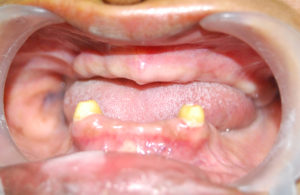
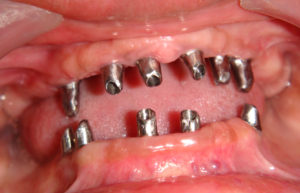
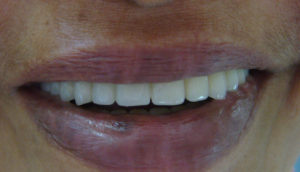
Hybrid Denture
Sample case: Full mouth fixed teeth replacement for completely edentulous patient
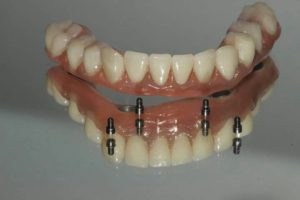
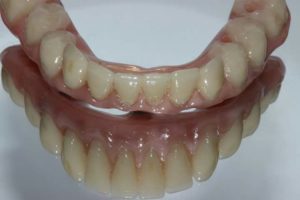
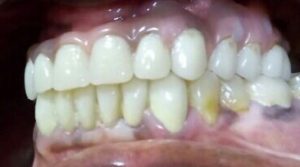
This approach is sometimes called the ‘All-on-4 technique’, ‘teeth-in-a-day’ or ‘same-day-smile’. It may be presented as a ‘new’ technique but this is actually a treatment we have been successfully carrying out in our practice for many years; we have treated several hundred patients in this way.
The technique may use four implants (sometimes described as the ‘All-on-4’) if there is only space available for 4 implants, but we usually prefer five or six implants to support a fixed bridge replacing 10-12 teeth particularly in a younger patient.
The implants are often placed at the same time as failing teeth are removed, and a bridge is provided on the day of surgery.
Our standard approach is to place the implants in the course of a surgery lasting just 30 -45 minutes. This treatment can be made even more comfortable for the patient by using a sophisticated Guided Surgery approach, in which implant positions are predetermined using 3D scanning and special software. Guided surgery allows us to prepare many aspects of the treatment in advance so that even complex surgery can often be completed in just 20-30 minutes or so, as the implants are quickly and precisely positioned with minimal surgery.
Later in the day a simple ‘immediate’ resin bridge is fitted made by our laboratory. This temporary bridge is then replaced with a more robust definitive bridge some months later.
Dental implants for patients with one or few teeth missing
Multiple teeth missing
We are pioneers in dental implant techniques, this has made our patient’s dental implant procedures more precise, effective and less invasive in fewer appointments.There have been very few people we have been unable to help.
Groups of missing teeth can be replaced with bridgework supported by implants. For example, two implants can support a bridge replacing three – four teeth, and more implants may be added if biting forces are heavy, or a larger bridge is required.
Once again, treatment is highly conservative as it is not necessary to prepare teeth to support bridgework; the implant construction simply replaces the missing teeth without further compromising any remaining teeth. We use state of art 3D imaging, software simulations and guided surgery to assist with planning and implant positioning.
The images show replacement of a single tooth, and multiple implants used to replace individual teeth. There are several advantages to this type of treatment:
- An implant-retained crown has a similar appearance to a normal crown and appears to emerge through the gum naturally.
- Replacing a missing tooth with an implant avoids having to cut into adjacent healthy teeth to support a dental bridge.
- The presence of the implant will slow the change in shape of the bone and gum where teeth have been lost.
- It is often easier to keep the independent implant-retained crown or bridge clean than a tooth-supported bridge extending over several teeth. As a result, the adjacent teeth may lead a normal uncompromised life.
Usually once an implant has been place we have to allow 8- 12 weeks for the implant to integrate into the bone. A crown or a bridge is then fabricated, usually in 2-3 sessions.
We sometimes place implants “immediately”, at the same time as the extraction takes place. If implants are well anchored, we may then also go on to also provide a resin crown or bridge at the same time – we call this teeth in an hour!
Single teeth missing
Replacing a single missing tooth is a spectacularly successful procedure at BB dental clinic. Treatment is highly conservative as it is not necessary to prepare adjacent teeth to support bridgework, and the implant tooth can be looked after just like your own natural teeth. The implant restoration itself is usually made with a combination of computer-aided design and 3D manufacturing technologies, and hand finished to produce a beautiful natural looking appearance.
Dental Implants on the Same Day
Teeth in a Day, Smile in a Day, Same Day Teeth, and All-on-4 are all procedures that we are renowned for – a life changing experience for our patients.
Surgical treatment to place the dental implants can take place in as little as 30 minutes, the implant teeth may be available immediately or within a few hours, and very few patients are turned away through lack of bone.We are expert in providing these treatments, with 3D printing, our own laboratories, and an extraordinary range of dental implants and components, making it easy for us to provide teeth on the same day as surgery. We have been providing this sort of immediate implant treatment for treatment for very many years!
Who are the candidates for dental implant?
People who are missing teeth may it be one or all are candidates for an implant. If a person is missing 1 or few teeth then dental implants along with a crown /bridge can be used to replace the missing teeth and these manmade teeth function as good as natural teeth and there is no further loss of bones and decay .If a person is missing all teeth then implant is used to anchor loose denture. In some cases when bones are lost; bones can be regenerated with the technique of bone expansion which further helps in implants.
How much does an implant cost?
The cost can be determined after thorough examination and recording of individual case. Moreover personnel skill of the dentist, location of the clinic and individual requirement determine the cost of an implant.
How much time is required?
Dental implant is a advance procedure hence it takes time of say 4-9 months or even more depending upon the individual case. The dentist does provide temporary teeth during this period and the patient is never without teeth.
Is the treatment painful?
There is a little discomfort at the time of the procedure but patient sedation and anesthesia are used to reduce the discomfort. Most of the patients experience pain for 2-3 days after the implant/surgery. Dentists also give medicines to reduce the pain and avoid any type of discomfort.
Are there any chances of rejection?
The body can reject soft tissue transplants i.e. kidney, lung, heart transplant but there is no rejection to dental implant by the body. There are chances of failure because of factors such as lack of focus on implant/some other condition, misalignment or diseases the patient suffers from.Dental implants use titanium material that is bio compatible i.e. it is compatible with the tissues of the body. Titanium is widely used now days to replace parts of the body.
When can I resume work?
The patient experiences discomfort and swelling on the day of surgery as well a day after the surgery. The patient is advised not to do any strenuous exercise. The decision to resume work depends on an individual.
What side effects one has to face without a dental implant?
When a person looses teeth the bones of the teeth also become weak and after some time these bones disappear other problems emerge such as:-
The adjacent teeth become week and there is no support for partials, dentures and bridges. These further results in pain, mobile tissues of the gum, sore spots, painful ridges, lack of retention etc.
The tongue also enlarges as it accommodates the space of missing teeth.
The diet changes and one has to survive on soft food.
Bone loss results in numbness of lower lips and there are chances of jaw fracture.
Bone loss makes the adjacent bones weak which causes falling of nearby teeth.
Hence one should start the treatment at an early stage because the problem becomes more severe if the treatment is delayed.




 Gallery of Smiles
Gallery of Smiles
